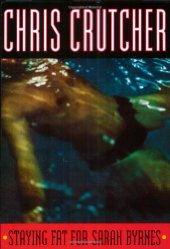Young adult (YA) realistic fiction is often referred to as the “problem novel.” Brian Sturm and Karin Michel have a nice description of the problem novel in their 2009 article “The Structure of Power in Young Adult Problem Novels.” The description reads as follows: “Contemporary realistic fiction is derived from actual circumstances, with realistic settings and characters who face problems and opportunities that are within the range of what is possible in real life.” Teenage readers like them because they can either relate to the characters and their situations, or they can use the characters and situations to explore territory where they have not gone themselves. However, the novels are complex and “gritty” which often draws the attention of those who would say they are inappropriate for adolescent readers.
Unfortunately, the challenges to this literature for adolescent readers usually come from those who have not actually read any of the novels they wish to challenge. They base their objections on cursory glances at pages, see language they consider inappropriate, and sound the alarm without actually reading the novel. My logic finds that a bit illogical! Is it wrong to voice concern or objection about a novel? No, but at least have actually read it first.
Some of my conservative friends – who also consider me a conservative because I actually am – might be surprised to hear me say that I would disagree with these would-be censors. I have read hundreds of YA novels, most of which fall into the “problem novel” genre. I have not found the language or situations to be gratuitous. What I have read is real – and after working for 24 years with at-risk kids, I know what real is for them. They want to know they are not alone in their situations, and they want to explore situations in which they have not had experience, and that is not a bad thing.
A young man in my high school English class last spring showed me a book by Ellen Hopkins and said something like, “I like these books. My mother is like this. I kind of understand her better now.” His mother is a drug addict who has been in and out of institutions and jail his whole life. If this book by a frequently challenged author helps him to understand her better, he has a better chance of stepping out of her footsteps and making better choices to help him avoid her fate.
If you would like to read opposing viewpoints on the “problem novel,” I recommend these two. (I side with Crutcher, by the way, in case I didn’t make my point clear. And may I highly recommend his novels. He is one of my top 5 favorite YA authors).
Gurdon, Meghan Fox. “Darkness Too Visible.” The Wall Street Journal, June 4, 2011
http://online.wsj.com/article/SB10001424052702303657404576357622592697038.html
Crutcher, Chris. “Young Adult Fiction. Let Teens Choose.” The Huffington Post, July 21, 2011
http://www.huffingtonpost.com/chris-crutcher/young-adult-fiction_b_906398.html
Here are three titles in the “problem novel” genre that I recommend, beginning with one of my favorites from Chris Crutcher:
Crutcher, Chris. Staying Fat for Sarah Byrnes. (2003).
Fat Eric and severely scarred Sarah have been friends for years, their respective problems providing them with a way to bond when they are rejected by their peers. But Eric finds that he likes swimming, and when he joins the swim team, his pounds begin to melt off. His feelings for Sarah do not change, but their ability to relate to each other in the same, comfortable way does. When Sarah suddenly stops talking and ends up committed in a mental ward, Eric is compelled to help his friend. What he finds out about her scars and her life may threaten their friendship forever when he shares what he knows with people he believes can help him to help her.
Anderson, Laurie Halse. Wintergirls. (2010).
Lia is 18 and has vowed to be the skinniest girl in school. Lia has anorexia, and after the death of her best friend Cassie, she is starving herself into nothing. Anderson’s creative use of formatting and the weaving of the mythical Persephone into the story create a powerful look into the mental illness with the highest mortality rate. As she did with the subject of rape in her novel Speak, Anderson once again takes an open and frank look at a very difficult subject and does it in a way that should provide young men and women with eating disorders with an open door for important discussions. Anderson's website provides trailers and other interesting information about this novel.
http://madwomanintheforest.com/youngadult-wintergirls
Lyga, Barry. Boy Toy. (2007)
Josh is a senior, a math whiz, and star baseball player. However, when Josh was in the 7th grade, he has sex with his teacher. Josh’s story is told in a series of flashbacks, and it’s a story that is hard to read. He’s confused, and as with many young victims, does not really understand what happened. It is not until he confronts the teacher after she is released from prison, in a shocking encounter for both Josh and the reader, that he understands this was not his fault and begins to find a place from which to begin healing.
Subscribe to:
Post Comments (Atom)





No comments:
Post a Comment